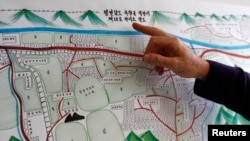The U.S. State Department has released its latest Trafficking in Persons Report, an annual assessment of how governments around the world are combating modern slavery.
A country that does nothing to prevent human trafficking is North Korea. Indeed, according to the 2017 Trafficking in Persons Report, or TIP Report, the government of North Korea “sponsored human trafficking through its use of forced labor in prison camps and labor training centers, facilitation of forced labor of students and its provision of forced labor to foreign companies through bilateral contracts.”
U.S. Secretary of State Rex Tillerson pointed out how the North Korea regime exploits its own people through “forced labor to generate illicit sources of revenue in industries including construction, mining, and food processing.” North Korea holds an estimated 80,000 to 120,000 prisoners in political prison camps in remote areas of the country. Political prisoners are subjected to beatings, torture, rape, a lack of medical care, and insufficient food. Many prisoners do not survive. Furnaces and mass graves are used to dispose the bodies of those who die in these prison camps.
Secretary Tillerson also noted that “an estimated fifty to eighty thousand North Korean citizens are working overseas as forced laborers, primarily in Russia and China, many of them working 20 hours a day.” Their pay largely confiscated by the North Korean regime.
The North Korean regime reaps hundreds of millions of dollars per year from the fruits of forced labor.
“Responsible nations,” said Secretary Tillerson, “simply cannot allow this to go on.”
According to the TIP Report, many of the estimated 10,000 North Korean women and girls who have migrated illegally to China to flee abuse and human rights violations at home are forced into prostitution, domestic service, or agricultural work through forced marriages. If found by Chinese authorities, victims are often forcibly repatriated to North Korea where they are subject to harsh punishment, including forced labor in labor camps or death.
Modern slavery, Secretary Tillerson noted in his introduction to the TIP Report “robs human beings of their freedom and their dignity. That's why we must pursue an end to the scourge of human trafficking,” including in North Korea.




